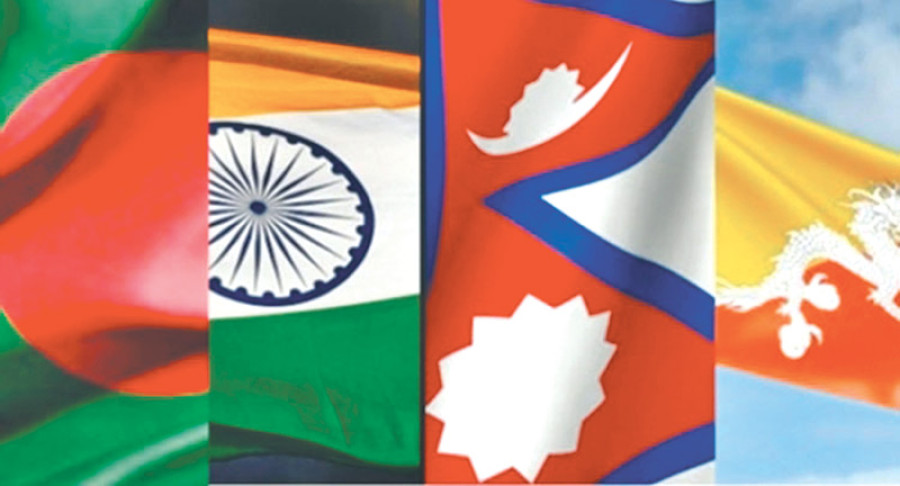Opinion
Three for the road
Bhutan has decided to stay out of the Bangladesh, Bhutan, India and Nepal (BBIN) Motor Vehicle Agreement (MVA) until it can be ratified.
Kamal Dev Bhattarai
Bhutan has decided to stay out of the Bangladesh, Bhutan, India and Nepal (BBIN) Motor Vehicle Agreement (MVA) until it can be ratified. Last week, the Bhutanese government decided not to table the MVA proposal in Parliament due to disagreements with the National Council and the opposition. Critics of the MVA are saying that BBIN will harm the country due to its small size and population.
Finalising the protocol
The pact signed in 2015 allows member states to operate their cargo and passenger vehicles in each other’s territory without having to clear customs at the border. Bhutan’s main opposition and transporters are saying that free movement will add to pollution and affect tourism and the local culture besides ultimately affecting the country’s sovereignty. So the remaining three countries—Bangladesh, India and Nepal—will have to take the MVA forward. Details such as vehicle type and route, charges and regulations have to be worked out for the MVA to be implemented. Efforts to finalise the protocol to the treaty are underway.
Of late, India has been pushing BBIN as an alternative to Saarc for regional economic cooperation and connectivity in an effort to show that Prime Minister Narenda Modi’s neighbourhood first policy is yielding results. In the beginning, a Saarc Motor Vehicle Agreement had been proposed, but Pakistan rejected it. Subsequently, Bhutan, Bangladesh, India and Nepal came together and signed a sub-regional agreement. The BBIN gathered momentum after the 18th Saarc Summit held in Kathmandu in 2014.
India has been pushing BBIN for two reasons. It believes that it can isolate Pakistan through BBIN. Moreover, with China increasing its footprint in South Asia through the One Belt, One Road (OBOR) initiative, India too wants to speed up connectivity projects with its immediate neighbours to maintain its influence in the region. China has been urging India’s neighbours such as Nepal, Bhutan and Bangladesh to join OBOR without any delay, and they have all expressed their readiness to do so.
Saarc alternative
Last January, speaking at the Raisina Dialogue, an annual conference on geopolitics and geo-economics held in New Delhi, Indian Foreign Secretary S Jaishankar said, “India is a founder member of Saarc, an organisation that has been made ineffective due to the insecurity of one member. We hope to partially remedy this through the BBIN sub-regional grouping.” He also said that the current level of enthusiasm among members of BIMSTEC (Bay of Bengal Initiative for Multi-Sectoral Technical and Economic Cooperation) can be channelled towards more far-reaching initiatives.
Many Indian policymakers and think tanks have been advising the government to enhance BIMSTEC and BBIN as an alternative to Saarc. Either that or they support a Saarc without Pakistan. India has said that it will not participate in the Saarc Summit if it is held in Islamabad. Meanwhile, Pakistan has said that it will not change the summit venue, but it is ready to work towards a favourable environment. This has put the future of Saarc in doubt. Since the cancellation of the Saarc Summit, India has been consistently maintaining that the meeting cannot happen in Islamabad under the current circumstances.
Overcoming hurdles
BBIN has not been moving forward as fast as expected, and there are many hurdles to implementing the schemes and projects under it. If BBIN is implemented, the Asian Development Bank will provide technical assistance for its connectivity projects. The grouping has planned to implement 30 road projects in the next five years at a cost of $8 billion. Other challenges such as border management and growing terrorism have impeded the implementation of BBIN.
“There is no doubt that enhancing inter-BBIN connectivity will pave the way for greater economic opportunities. The question, however, is how the BBIN nations will deal with the concomitant risks and challenges of opening up their border,” said a report released by the Observer Research Foundation, a New Delhi-based think tank, in August last year. “While the bulk of travel of persons across BBIN’s borders is for legitimate purposes, the proliferation of cross-border crime undermines the smooth management of boundaries,” the report said. Stressing the need to stop growing extremism in Nepal, Bangladesh and Bhutan to make BBIN possible and safe, the report said, “Controlling the movement of extremists, radicals and insurgent groups is a big challenger for the border security organisations.”
The political leadership of Nepal, Bangladesh and India should take immediate measures to implement the MVA and other areas of cooperation under the BBIN framework. As Nepal-India and India-Bangladesh connectivity projects have been gaining momentum in recent months, it will be easier for the three countries to implement components of BBIN. It is already two years late, so there should not be further delays in implementing BIN (Bangladesh, India and Nepal).
Bhattarai is the Kathmandu Post’s New Delhi correspondent




 9.6°C Kathmandu
9.6°C Kathmandu










